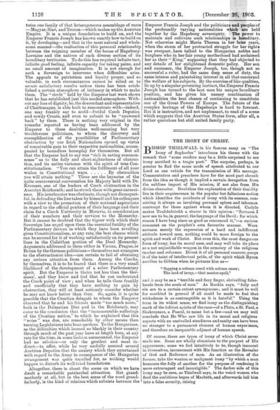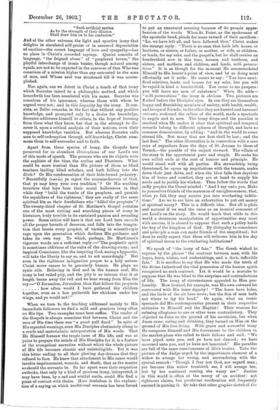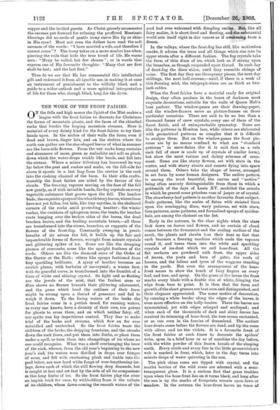THE IRONY OF CHRIST. B ISHOP THIRLWALL in his famous essay
on " The Irony of Sophocles" introduces his theme with the remark that " some readers may be a little surprised to see irony ascribed to a tragic poet." The surprise, perhaps, is greater to find the same mode of speech attributed to our Lord as one vehicle for the transmission of His message. Commentators and preachers have for the most part shrunk from the idea as though it implied a certain derogation from the sublime import of His mission, if not also from His divine character. Doubtless the explanation of their timidity lies in their acquiescence in the popular but fallacious notion which identifies the accidents of irony with its essence, con- ceiving it always as involving personal spleen and inhuman contempt for those against whom it is directed. Carlyle makes Teufelsdrockh a sharer in this opinion : "Sarcasm I now see to be, in general, the language of the Devil : for which reason I have long since as good as renounced it,"—a curious comment on the prophet's own favourite manner. Were sarcasm merely the expression of a hard and indifferent attitude toward men, nothing could be more foreign to the spirit and work of Christ. But even this, the most dangerous form of irony, has its moral uses, and may well take its place as a not unjustifiable weapon in the armoury of the religious teacher and reformer. Divest it of all personal rancour, purge it of the taint of intellectual pride, of the spirit which Byron ascribes to Gibbon when he pictures him as-
" Sapping a solemn creed with solemn sneer; The lord of irony,—that master-spell,"
and it may be as a " terrible and fiery finger, shrivelling false- hoods from the souls of men." As Ruskin says, " folly and sin are to a certain extent synonymous ; and it must be well for mankind in general if all could be made to feel that wickedness is as contemptible as it is hateful." Using the term in its widest sense, we find irony as the distinguishing mark of the loftiest spirits of the race—of a Plato, a St. Paul, a Shakespeare, a Pascal, to name but a few—and we may well conclude that He Who saw life in its moral and religious aspects with an unrivalled steadiness and sanity can have been no stranger to a permanent element of human experience, and therefore an inseparable adjunct of human speech.
Of course, there are types of irony of which Christ never made use. Some are wholly obnoxious to the purport of His appearance ; some we feel intuitively to be, though innocent in themselves, inconsonant with His function as the Revealer of God and Redeemer of man. As an illustration of the former, take the wanton or malignant irony "by which a man humours the folly of another for the purpose of rendering it more extravagant and incorrigible." The darker side of this irony may be seen, as Thirlwall says, in the weird women who feed the ambitious hopes of Macbeth, and afterwards lull him into a false security, raising
"Such artificial sprites As by the strength of their illusion Shall draw him on to his confusion."
And at the other extreme, the light and sportive irony that delights in simulated self-praise or in assumed depreciation of another—the covert language of love and sympathy—has no place in Christ's recorded sayings. Quaint conceits of language, "the feigned abuse " of "perplexed lovers," the playful interchange of ironic banter, though natural among equals, are not to be expected in the converse of One Who was conscious of a mission higher than any entrusted to the sons of men, and Whose soul was straitened till it was accom- plished.
Nor, again, can we detect in Christ a touch of that irony which Socrates raised to a philosophic method, and which henceforth has been associated with his name. Socrates was conscious of his ignorance, whereas those with whom he argued were not ; and in this disparity lay the irony. It con- sists, as Zeller remarks, in the fact that without any positive knowledge, and prompted only by a desire for knowledge, Socrates addresses himself to others, in the hope of learning from them what they know, but that in the attempt to dis- cover it, upon a critical analysis of their notions, even their supposed knowledge vanishes. But whereas Socrates calls men to self-redemption through self-knowledge, Christ sum- mons them to self-surrender and to faith.
Apart from these species of irony, the Gospels have preserved for us abundant illustrations of our Lord's use of this mode of speech. The persons who are its objects were the sophists of the time, the scribes and Pharisees. What could be more ironical than His picture of them as blind teachers leading blind scholars, and both falling into the ditch P Or His condemnation of their hide-bound pedantry : "Beautifully (zco.7.4) ye reject the commandments of God, that ye may keep your own tradition " ? Or His scathing invective that lays bare their moral hollowness in that while they " build the tombs of the prophets, and garnish the sepulchres of the righteous," they are really of the same spiritual kin as their forefathers who "killed the prophets " ? The twenty-third chapter of St. Matthew's Gospel contains one of the most cutting and searching pieces of irony in literature, truly terrible in its sustained passion and revealing power. Some critics will have it that our Lord here exceeds all the proper bounds of decorum, and falls into the tempta- tion that besets every prophet, of turning in misanthropic rage upon the generation which declines His guidance and takes its own way. To which, perhaps, Dr. Martineau's vigorous words are a sufficient reply :—" The prophetic spirit is sometimes oblivious of the rules of the drawing-room ; and inspired Conscience, like the inspiring God, seeing a hypocrite, will take the liberty to say so, and to act accordingly." But even in the righteous indignation proper to a holy nature, Christ never ceases to be genuinely human. He plays no cynic role. Believing in God and in the human soul, His irony is but veiled pity, and the pity is so intense that it at length burns away the veil and we hear wrung from Him the cry:—" 0 Jerusalem, Jerusalem, thou that killest the prophets how often would I have gathered thy children together, even as a hen gathereth her chickens under her wings, and ye would not! "
When we turn to the teaching addressed mainly to His immediate followers we find a mild and gracious irony often on His lips. Two examples must here suffice. The reader of the Gospels is always conscious that between Christ and the men of His time there was " a great gulf fixed." In spite of His repeated warnings, even His Disciples obstinately clung to a crude and materialistic interpretation of His words. That He Himself foresaw the tragic issue of His life, and was at pains to prepare the minds of His Disciples for it, is a feature of the evangelical narrative without which the whole picture of His life becomes chaotic and unintelligible. Yet it was this bitter ending to all their glowing day-dreams that they refused to face. He knew that attachment to His cause would involve imprisonment, wounds, and death, that as the master so should the servants be. So far apart were their respective outlooks, that only by a kind of gracious irony. interpreted, it may have been, by a sad and wistful smile, could His find a point of contact with theirs. Here doubtless is the explana- tion of a saying on which traditional exeuesis has been forced to put an unnatural meaning because of its prosaic appre- hension of the words. When St. Peter, as the spokesman of the apostolic band, pleads for some reward of their sacrifices : "Lo, we have left all, and have followed thee," Christ makes the strange reply : " There is no man that hath left house, or brethren, or sisters, or father, or mother, or wife, or children, or lands, for my sake, and the gospel's, but he shall receive an hundredfold now in this time, houses, and brethren, and sisters, and mothers, and children, and lands, with persecu- tions." It is as though for the moment He accommodated Himself to His hearer's point of view, and by so doing moat effectually set it aside. He seems to say : "You have sacri- ficed relatives, lands, and houses fcr my sake, but you will be repaid in kind a hundredfold. You came to me paupers ; you will leave me men of substance." When He adds- " with persecutions" the irony is obvious. Two pictures are flashed before the Disciples' eyes. In one they see themselves happy and flourishing members of society, with health, wealth, and troops of friends; in the other they are hunted and harassed outcasts, reckoned the refuse of the world, made a spectacle to angels and to men. The irony drops and the paradox is resolved when He makes it clear that spiritual and temporal rewards belong to different spheres of thought, and have no common denominator, by adding : "and in the world to come eternal life. But many that are first shall be last ; and the last first." The other illustration is in connection with a sore crux of expositors from the days of St. Jerome to those of Trench,—the parable of the unjust steward. The villain of the story is the opportunist pure and simple. He seeks his own selfish ends at the cost of honour and principle. He would stand well with all parties. His stewardship being threatened, he opens up negotiations with the tenants, scales down their just debts, and when the blow falls that deprives him of home and comfort, they are at hand to supply his needs and to justify his wisdom. Then follow the words that sadly perplex the literal-minded " And I say unto you, Make to yourselves friends of the mammon of unrighteousness; that, when ye fail, they may receive you into everlasting habita- tions." Are we to see here an exhortation to put out money at spiritual usury ? This is a difficult idea. But all is plain and natural if we read the verse as an ironical comment of our Lord's on the story. He would teach that while in this world a dexterous manipulation of opportunities may meet with success, it is absurd to suppose that such a policy holds the key of the kingdom of God. By disloyalty to conscience and principle a man can make friends of the nnspiritual ; but does he really expect that these will welcome him in his day of spiritual stress to the everlasting habitations ?
We speak of " the irony of fate." The Greek wished to express by the phrase " the contrast between man, with his hopes, fears, wishes, and undertakings, and a dark, inflexible fate." It is needless to say that He who made the truth of the divine fatherhood the vital possession of the human spirit recognised no such contrast. Yet it would be a mistake to suppose that He was blind to the surprises and contradictions of life. The irony of circumstance appealed to Him pro- foundly. How ironical, for example, was His own outward lot contrasted with His inner dignity ! " The foxes have holes, and the birds of the air have nests; but the Son of man bath not where to lay his head." Or again, what an ironic spectacle did His contemporaries present in their respective attitudes to Himself and the Baptist! Their reasons for refusing allegiance to one or other were contradictory. They objected to John on the ground of his asceticism, but when Jesus came, eating and drinking, they turned on Him on the ground of His free living. With grave and sorrowful irony He compares Himself and His forerunner to the children in the market-place who called to their fellows and said : " We have piped unto you, and ye have not danced; we have mourned unto you, and ye have not lamented." His parables are full of the same consciousness of life's ironies. Take the picture of the Judge urged by the importunate clamour of a widow to avenge her wrong, and surrendering with the cynical remark : " Though I fear not God, nor regard man ; yet because this widow troubleth me, I will avenge her, lest by her continual coming she weary me." Justice in this world is often at the mercy of an accident: not righteous claims, but persistent vociferation will frequently succeed in gaining it. Or take that other graphic sketch of the
supper and the invited guests. As Christ gravely enumerates the excuses put forward for refusing the proffered Messianic blessings did no smile of gentle irony curve His lip or shine in His eyes ? Must not even the dullest have read the soft sarcasm of the words : " I have married a wife, and therefore I cannot come " ? The irony takes on a more sombre hue when, piercing the veils that hide the true trend of life, He warns men : "Many be called, but few chosen "; or in words that express one of His favourite thoughts : "Many that are first shall be last; and the last first."
Thus do we see that He has consecrated this intellectual gift and redeemed it from all ignoble use, in making it at once an instrument of punishment to the wilfully blind, and a guide to a wider outlook and a more spiritual interpretation of life for those who, though blind, long for the dawn.








































 Previous page
Previous page